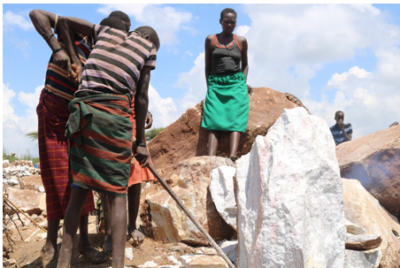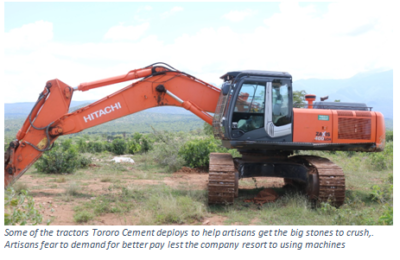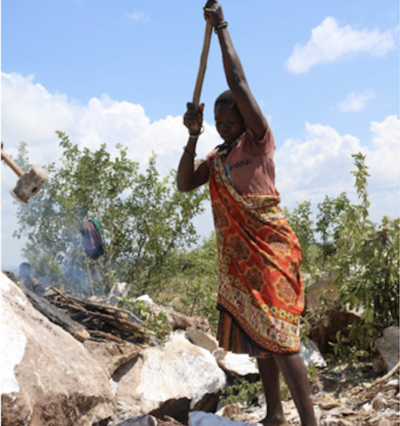Money is not food. This is a lesson limestone miners at Tapech Mine located in Moroto district, Karamoja region, learnt the hard way during the COVID-19 lockdown in Uganda. The artisans at Kosiroi whose main job is crushing stone to fill trucks, hardly have time to engage in other activities, including growing food for their consumption. Kosiroi is one of the biggest lime mining sites in Karamoja, where Tororo Cement collects raw material for making cement and tiles.

Miners extracting limestone.
Residents have previously lost several live stocks during the disarmament process and after attacks from neighbouring tribes, especially those from Kenya and Sudan; whose governments have not fully disarmed them. The loss of cattle, coupled with effects of extreme climate variability, which exposes the region to food insecurity and consequently high poverty levels, has seen many Karamojong communities resort to mining. The Karamoja region is richly endowed with minerals including gold, diamonds, and lime.
The mining sector has proven to a major source of income with a majority of women engaged in artisanal mining businesses while others work with established mining companies. Kosiroi in Tapach where Tororo Cement has a 15-year extracting contract is one of the biggest mining sites that artisans work from. Trucks from Tororo Cement collect stones daily, from which the company gets lime for cement and tiles among other products. A big truck costs 240,000 Ugandan Shillings- UGX ($65), while a smaller one goes for 200,000 UGX ($54).

Sarah Akello, the SOGDEK Miners Association chairperson, explains that it takes five people (usually men) about five days to fill a truck. The people crushing are paid about UGX 7,000 ($2). In total, labour for filling one truck costs 175,000UGX ($47). This excludes Ebutia (local brew to motivate the workers and food). This means that the person engaging workers gets between 20-40,000UGX ($5-11), while the workers get about 30,000UGX ($8) from five days of work.
The artisans say this money is little and perpetuates a hand to mouth culture, but they dare not challenge companies lest they are replaced by automated systems and machine since they already have a running contract with the government

Maria Nantem one of the miners crushing stones at Kosiroi, in Uganda.
Still, they dare not challenge companies lest they are replaced by automated systems and machine since they already have a running contract with the government. The small income also means that the artisans have to work daily, meaning they cannot tend to other activities like farming like other rural-based dwellers.
For food and other supplies, this community depends on supply from Tororo Cement, whose trucks, when picking materials, also deliver goods and other products including food. This had never been a cause for concern until the COVID–19 national lockdown when supply was cut off. According to Sarah, not only were they no longer earning, they experienced severe food shortage.
The lockdown had initially not affected them, but after continued reports of drivers from the borders testing positive, the government banned travel to and from border towns. Kosiroi is located in Moroto district at the edge of Uganda and Kenya.

Image by leo2014 from Pixabay.
Tororo Cement conducted sensitization sessions in which they insisted artisans should guard against COVID-19 by following the safety precautions. They also provided them with protective gear such as gloves, masks and sanitizers. Maria Nantem narrates that she had to walk close to 50km to Moroto town to get food. By the time she arrived, it was too late to travel back, and she had to sleep in the market. Carrying the food all the way ago was another disaster, she decries.
According to Sarah and Maria, the suffering they experienced taught them a lesson; never to focus solely on getting paid wages without putting time aside to grow their own food. “If you have some money but cannot buy food, how does money help you? Sarah asks. Against this backdrop, SOGDEK Miners Association has resolved to encourage miners to take time off and grow food as well as utilize the granaries to store food instead of relying on supplies by external entities.
Read More – Covid-19 Impact stories from Uganda and Nigeria.
Exploring Mobile Apps for Business during Lockdown
Business Post Covid-19: Bringing women’s voices to the centre.
Not business as usual post COVID-19: Bringing women’s voices to the centre.










 The Trust supports and mobilises civil society networks on issues of ending child marriage, ending violence against children, ending female genital mutilation and promoting children’s rights, to carry out advocacy and action across Africa. Special focus is placed on Malawi, Mozambique, Tanzania and Zambia where child marriage continues to be a problem largely driven by poverty, gender inequality, harmful traditional practices, conflict, low levels of literacy, limited opportunities for girls and weak or non-existent protective and preventive legal frameworks.
The Trust supports and mobilises civil society networks on issues of ending child marriage, ending violence against children, ending female genital mutilation and promoting children’s rights, to carry out advocacy and action across Africa. Special focus is placed on Malawi, Mozambique, Tanzania and Zambia where child marriage continues to be a problem largely driven by poverty, gender inequality, harmful traditional practices, conflict, low levels of literacy, limited opportunities for girls and weak or non-existent protective and preventive legal frameworks.




 Education is a fundamental right for all children, which is also a vehicle for social, economic and political transformation in communities, countries and the African continent at large. Recent studies indicate a lack of progress in some of the critical commitments aimed at improving education quality, access, retention and achievement, particularly for girls. In most African countries, girls may face barriers to learning, especially when they reach post-primary levels of education. By implementing multi-dimensional approaches to education which includes core education, personal development, life skills and economic competencies, the Trust partners with funding partners, governments, civil societies and the private sector to improve education access.
Education is a fundamental right for all children, which is also a vehicle for social, economic and political transformation in communities, countries and the African continent at large. Recent studies indicate a lack of progress in some of the critical commitments aimed at improving education quality, access, retention and achievement, particularly for girls. In most African countries, girls may face barriers to learning, especially when they reach post-primary levels of education. By implementing multi-dimensional approaches to education which includes core education, personal development, life skills and economic competencies, the Trust partners with funding partners, governments, civil societies and the private sector to improve education access.

 The Nutrition and Reproductive, Maternal, New-born, Child and Adolescent Health and Nutrition, (RMNCAH+N) of the Children’s Rights and Development Programme aims at promoting the Global Strategy for women, children and adolescents’ health within the Sustainable Development Goals (SDG) agenda. The strategy emphasises on the importance of effective country leadership as a common factor across countries making progress in improving the health of women, children and adolescents.
The Nutrition and Reproductive, Maternal, New-born, Child and Adolescent Health and Nutrition, (RMNCAH+N) of the Children’s Rights and Development Programme aims at promoting the Global Strategy for women, children and adolescents’ health within the Sustainable Development Goals (SDG) agenda. The strategy emphasises on the importance of effective country leadership as a common factor across countries making progress in improving the health of women, children and adolescents. Through its Early Childhood Development (ECD) plan, The Trust will seek to put into action the new science and evidence Report that was presented by Lancet Series on Good and early development – the right of every child. This will be achieved by mobilising like-minded partners to contribute in the new science and evidence to reach all young children with ECD. The Trust’s goal is to be a catalyst for doing things differently, in particular, to rid fragmentation and lack of coordination across ECD sectors. In response to evidence showing the importance of political will in turning the tide against the current poor access and quality of ECD. Even before conception, starting with a mother’s health and social economic conditions, the early years of a child’s life form a fundamental foundation that determines whether a child will survive and thrive optimally.
Through its Early Childhood Development (ECD) plan, The Trust will seek to put into action the new science and evidence Report that was presented by Lancet Series on Good and early development – the right of every child. This will be achieved by mobilising like-minded partners to contribute in the new science and evidence to reach all young children with ECD. The Trust’s goal is to be a catalyst for doing things differently, in particular, to rid fragmentation and lack of coordination across ECD sectors. In response to evidence showing the importance of political will in turning the tide against the current poor access and quality of ECD. Even before conception, starting with a mother’s health and social economic conditions, the early years of a child’s life form a fundamental foundation that determines whether a child will survive and thrive optimally.